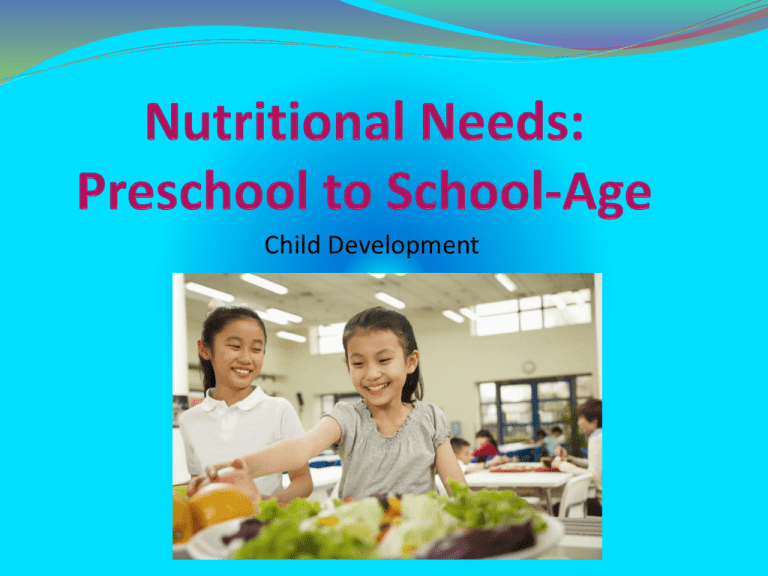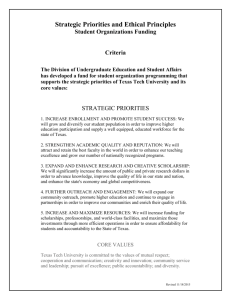
Child Development
Copyright
Copyright and Terms of Service
Copyright © Texas Education Agency, 2015. These materials are copyrighted © and trademarked ™ as the property of the
Texas Education Agency (TEA) and may not be reproduced without the express written permission of TEA, except under
the following conditions:
1) Texas public school districts, charter schools, and Education Service Centers may reproduce and use copies of the
Materials and Related Materials for the districts’ and schools’ educational use without obtaining permission from TEA.
2) Residents of the state of Texas may reproduce and use copies of the Materials and Related Materials for individual
personal use only, without obtaining written permission of TEA.
3) Any portion reproduced must be reproduced in its entirety and remain unedited, unaltered and unchanged in any way.
4) No monetary charge can be made for the reproduced materials or any document containing them; however, a
reasonable charge to cover only the cost of reproduction and distribution may be charged.
Private entities or persons located in Texas that are not Texas public school districts, Texas Education Service Centers, or
Texas charter schools or any entity, whether public or private, educational or non-educational, located outside the state
of Texas MUST obtain written approval from TEA and will be required to enter into a license agreement that may involve
the payment of a licensing fee or a royalty.
Contact TEA Copyrights with any questions you may have.
Copyright © Texas Education Agency, 2015. All rights reserved. (Revised)
2
Growth During the Preschool Years
There is a wide range of
"normal" growth.
Between the ages of two
and five, the average
child grows about 2½
inches taller each year,
and also gains four to
five pounds each year.
Copyright © Texas Education Agency, 2015. All rights reserved. (Revised)
3
What influences growth?
Copyright © Texas Education Agency, 2015. All rights reserved. (Revised)
4
Growth During School-Age Years
A school-age child should
be:
Becoming more aware of
their body
Focusing attention for
longer periods of time
Moving in a more strong,
coordinated manner
Using complex sentences
Copyright © Texas Education Agency, 2015. All rights reserved. (Revised)
5
ChooseMyPlate
Put the plan into action by:
Choosing a variety of
foods
Choosing healthy snacks
Making smart beverage
choices
Serving small portions
Source: ChooseMyPlate.gov
Copyright © Texas Education Agency, 2015. All rights reserved. (Revised)
6
Eat a Variety of Nutrient-Rich Foods
Servings are based on:
Activity level
Age
Gender
Copyright © Texas Education Agency, 2015. All rights reserved. (Revised)
7
Caloric Needs of Children
Age
Caloric Needs
Two –year-old
1,000 calories
Five-year-old
1,400 calories
Ten-year-old
1,800 calories
Copyright © Texas Education Agency, 2015. All rights reserved. (Revised)
8
Snacks for Preschool and
School-Age Children
Hummus or peanut
butter and whole-grain
crackers
Sandwiches prepared
with whole-grain bread
Trail mix made from lowsugar cereal, dried fruit,
chopped nuts, and mini
chocolate chips
Copyright © Texas Education Agency, 2015. All rights reserved. (Revised)
9
Kids Rock Nutrition in the Kitchen
(click on picture)
Copyright © Texas Education Agency, 2015. All rights reserved. (Revised)
10
Healthy Habits for Children
Cut children's’
portion sizes by 0nehalf to one-third of an
adult’s serving size.
Copyright © Texas Education Agency, 2015. All rights reserved. (Revised)
11
Serving vs. Portion Sizes
A deck of cards =
three ounces of
cooked meat,
poultry, or fish
A music CD =
one pancake
or waffle
Six dice = one
and one-half
ounces of
cheese
Copyright © Texas Education Agency, 2015. All rights reserved. (Revised)
12
Serving vs. Portion Sizes
A small fist = one-half of
a cup of fruit, vegetable,
cooked cereal, pasta or
rice
Your thumb tip = one teaspoon of
margarine or butter
Copyright © Texas Education Agency, 2015. All rights reserved. (Revised)
13
Serving vs. Portion Sizes
A small plate (7
inch) = one tortilla
A computer
mouse = one
small baked
potato
A baseball =
one medium
apple or orange
Copyright © Texas Education Agency, 2015. All rights reserved. (Revised)
14
Serving vs. Portion Sizes
The width of a small
soft drink lid = onehalf of a bagel
Four checkers =
four small
cookies (like
vanilla wafers)
A golf ball =
two
tablespoons of
peanut butter
Copyright © Texas Education Agency, 2015. All rights reserved. (Revised)
15
Portion Distortion Interactive Quiz
(click on picture)
Copyright © Texas Education Agency, 2015. All rights reserved. (Revised)
16
Portion Distortion
Copyright © Texas Education Agency, 2015. All rights reserved. (Revised)
17
Childhood Obesity
Risks for children can
include:
Depression
Heart disease
Hypertension
Poor self-esteem
Sleep apnea
Source: Love Our Children USA
Copyright © Texas Education Agency, 2015. All rights reserved. (Revised)
18
Child Malnutrition
Can cause:
Bone disease
Death
Depression
Poor self-esteem
Reproductive problems
Seizures
Copyright © Texas Education Agency, 2015. All rights reserved. (Revised)
19
Review
What influences physical growth?
What are four examples of nutritious snacks for a
preschool child? School-age child?
What are the health risks for obese children?
What is portion control and give three examples.
What is child malnutrition?
Copyright © Texas Education Agency, 2015. All rights reserved. (Revised)
20
Copyright © Texas Education Agency, 2015. All rights reserved. (Revised)
21
References and Resources
Images:
Microsoft Clip Art: Used with permission from Microsoft™. (Slides 12, 14, 15, 17 and 19)
Photos obtained through a license with Shutterstock™. (Slides 1, 3, 4, 5, 7, 8, 9, 10, 11, 13, 16, 18 and 20)
United States Department of Agriculture. (Slide 6)
Publications:
Caring for Children
Kids can cook and learning is the secret ingredient!
http://cte.sfasu.edu/wp-content/uploads/2012/07/CaringForKids3-5.pdf
Textbook:
Decker, C. (2011). Child development early stages through age 12. (7th ed.). Tinley Park: Goodheart-Willcox Company, Inc.
Websites:
Health and Nutrition Information for Preschoolers
Help your preschoolers eat well, be active, and be healthy.
http://www.choosemyplate.gov/preschoolers.html
Choosemyplate.gov
Anyone eating on the run or at restaurants has probably noticed that food portions have gotten larger. Some portions are called "super-size," while others
have simply grown in size and provide enough food for at least two people. With this growth have come increases in waistlines and body weight.
http://www.choosemyplate.gov/supertracker-tools/portion-distortion.html
Choose MyPlate.gov
Health and Nutrition Information for Children Over Five
http://www.choosemyplate.gov/children-over-five.html
Let’s Move: America’s Move to Raise a Healthier Generation of Kids
Let’s Move! is dedicated to solving the problem of childhood obesity within a generation so that every child born today—grows up healthy. Provides
corresponding activities for each step.
http://www.letsmove.gov/kids
Copyright © Texas Education Agency, 2015. All rights reserved. (Revised)
22
References and Resources
Love Our Children USA
Childhood Obesity and Malnutrition ... The Newest Forms of Child Abuse
http://loveourchildrenusa.org/childobesity_malnutrition.php
Nutrition Education of Texas
Teaching Nutrition: Background information about nutrition, nutrients, and healthy eating habits. Topics include nutrients,
food safety, selecting a balanced diet, nutritional needs during the lifecycle, nutrition and health. For additional information,
visit:
http://netx.squaremeals.org/teaching_nutrition.html
Recipe Finder Cookbook
Snap-Ed Connection. Child Development Suggested Nutritious Recipes for Children
http://cte.sfasu.edu/wp-content/uploads/2012/07/Nutritious-Recipes-for-Children.pdf
United States Department of Agriculture
Here are some food safety recommendations from the U.S. Department of Agriculture (USDA) to help keep kids safe after
school.
http://www.fsis.usda.gov/Fact_Sheets/Food_Safety_AFter_School/index.asp
YouTube™:
Kids Rock Nutrition In The Kitchen
Are you ready to have some fun in the kitchen? Teaching kids to cook is a great way for everyone to learn about different foods
and how nutritious they are. Watch a chef and registered dietitian show children how easy it is to make chicken or fish veggie
packets and yogurt parfaits.
https://youtu.be/YRylRNVxPj4
Copyright © Texas Education Agency, 2015. All rights reserved. (Revised)
23







